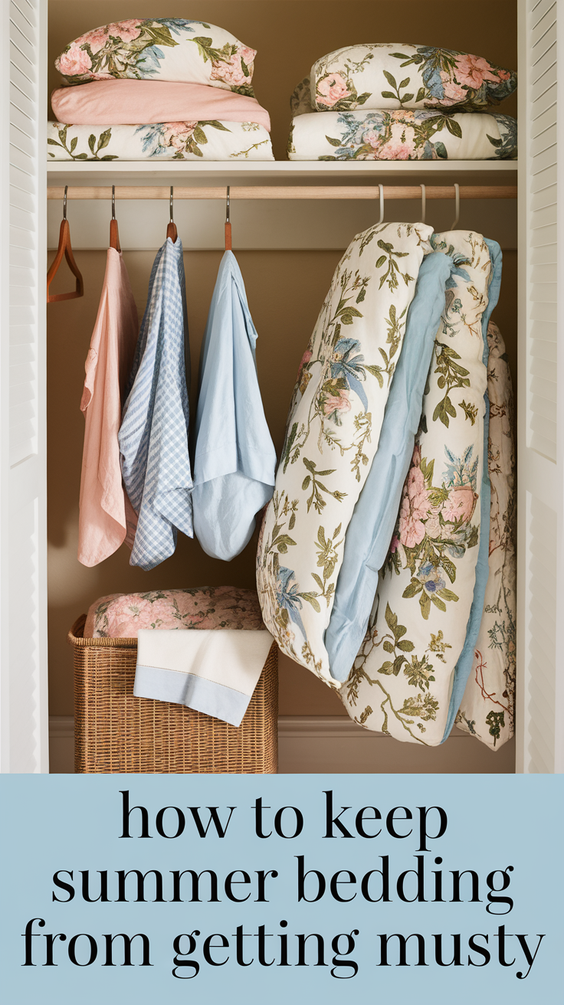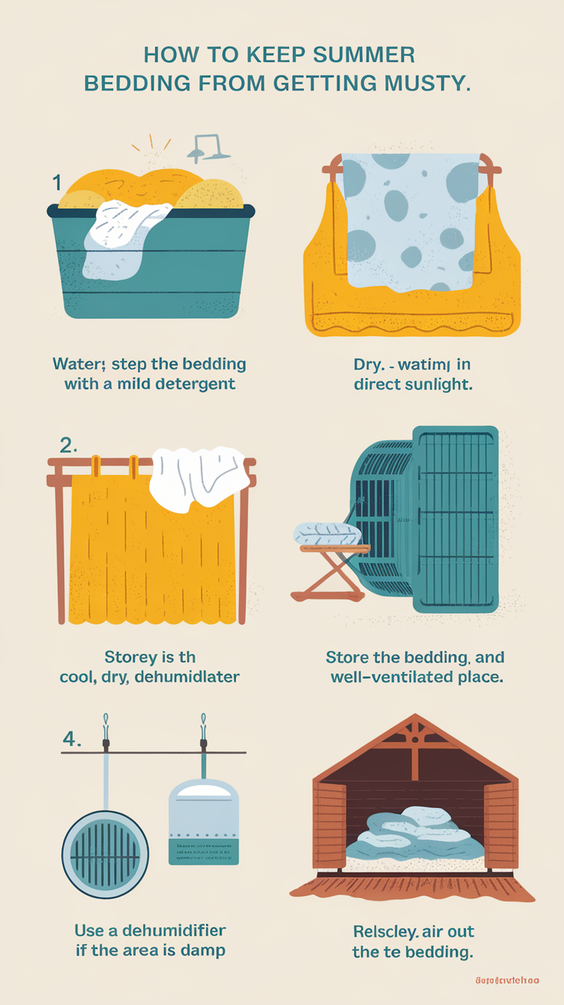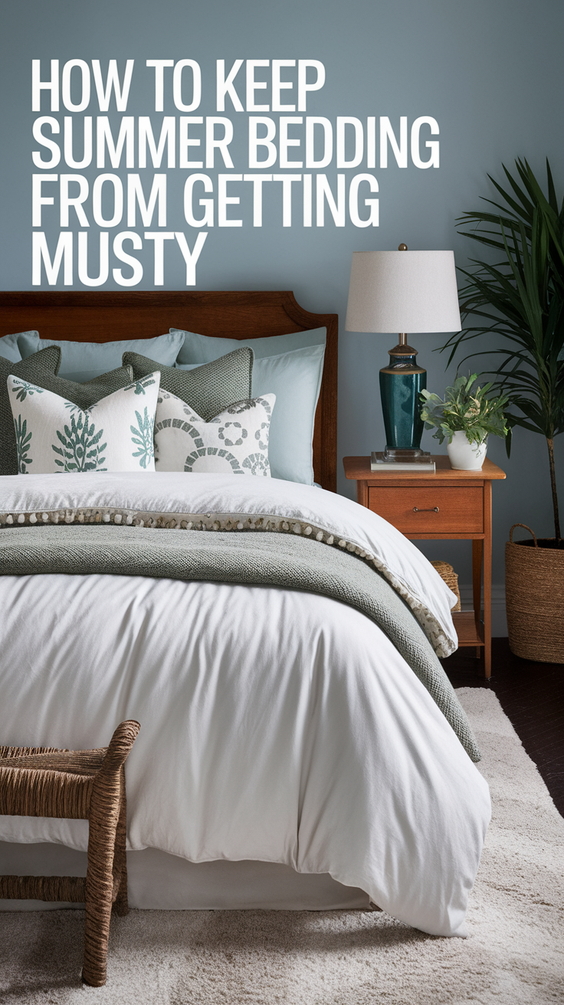How to Keep Summer Bedding from Getting Musty in 2025
Why Summer Bedding Is More Prone to Mustiness
Have you ever noticed your bedding smelling stale after a few hot days? You’re not alone. In 2025, with humidity levels rising and indoor air quality fluctuating due to extreme weather, summer bedding has become more susceptible to musty odors than ever before.
This happens primarily because of trapped moisture—either from sweat, ambient humidity, or insufficient ventilation. When your sheets or blankets don’t dry out completely, mildew and bacteria can quickly set in. Left unchecked, this doesn’t just create an unpleasant smell—it can irritate your skin or trigger allergies.
So how do you avoid it? Let’s walk through practical, modern solutions to keep your summer bedding fresh, clean, and comfortable all season long.
Which Fabrics Are Most Affected and Why It Matters
Not all bedding is created equal. Some fabrics are natural moisture magnets, while others allow better airflow and faster drying. Knowing the difference helps prevent odor buildup.
Cotton and linen are breathable but can hold on to dampness if not aired out properly. Microfiber, while popular for its softness and affordability, tends to trap heat and moisture, making it a breeding ground for mildew. Blended fabrics can also be problematic, especially those that contain polyester.
Pro tip: For summer, opt for light cotton percale or bamboo fiber. They’re breathable, quick-drying, and naturally antimicrobial.
7 Common Mistakes That Lead to Musty Bedding
Even well-meaning habits can backfire in hot, humid weather. Here are the top mistakes to avoid:
Leaving bedding on the bed all day with windows closed
Folding and storing linens before they’re completely dry
Overusing fabric softener, which traps residues
Not rotating bedding often enough
Storing in plastic containers with no airflow
Washing in cold water only (which doesn’t kill bacteria)
Not using breathable mattress and pillow protectors
These small errors add up, especially in summer. Awareness is the first step toward change.
How to Wash Summer Bedding to Prevent Odors
Choose the Right Temperature and Cycle
Always check care labels, but for most cotton or linen sheets, use warm water (90–110°F). This helps dissolve body oils and kill odor-causing bacteria.
Add Natural Deodorizers
A ½ cup of white vinegar or ¼ cup of baking soda in your wash can naturally neutralize odors. These options are safe and eco-friendly.
Wash Frequency
In summer, it’s ideal to wash your sheets every 5–7 days. If you’re prone to night sweats or allergies, every 3–4 days may be better.
Where and How to Dry Bedding in Hot Weather
Drying properly is just as important as washing. In summer, the temptation is to toss everything in the dryer or hang items in a shaded room—but that can lead to mustiness.
Outdoor Drying Tips
Hang bedding in direct sunlight when possible—UV rays kill bacteria.
Shake out linens every hour to prevent stiffness.
Avoid drying in early morning when dew is still present.
Indoor Drying Alternatives
If you can’t dry outside, use a well-ventilated room with a fan or dehumidifier. Avoid laying bedding flat across surfaces—airflow underneath is crucial.
Quick Tip: Fold bedding only when it’s 100% dry. Even a slight damp spot can lead to mildew in storage.
Best Practices for Storing Summer Bedding
Storage plays a huge role in freshness, especially if you’re rotating linens weekly.
| Storage Tip | Why It Works |
|---|---|
| Use breathable cotton bags | Allows airflow and prevents trapped moisture |
| Avoid plastic bins | Traps humidity and encourages mildew growth |
| Add cedar blocks or lavender | Natural antifungal and refreshing scent |
| Keep in cool, dry locations | Reduces risk of microbial growth |
Bonus idea: Store sheets inside matching pillowcases. It keeps sets together and improves airflow.
Natural Aromatics to Keep Bedding Fresh
Artificial fragrance sprays can mask odor but often build up over time. Instead, opt for nature-based solutions:
Dried lavender pouches between folded sheets
Cedarwood blocks in storage drawers
Essential oil diffuser in the room
Eucalyptus or mint sprays (lightly misted after drying)
Want a DIY idea? Mix 1 cup of distilled water with 10 drops of your favorite essential oil and 1 tablespoon of rubbing alcohol. Spray lightly over bedding after making the bed.
What to Do If the Musty Smell Has Already Set In
Caught it too late? Don’t worry—it’s fixable.
Immediate Steps
Rewash with hot water and 1 cup of vinegar
Dry outdoors in direct sunlight
Use a steam cleaner if the smell is in heavier blankets or mattress toppers
For Persistent Odors
Soak items overnight in baking soda and warm water
Use hydrogen peroxide for white fabrics
If mold is visible, it may be time to replace the item
Important: A moldy smell in just-washed bedding might indicate an issue with your washing machine—run a drum cleaning cycle with bleach or citric acid monthly.
How Bedroom Ventilation Affects Bedding Freshness
Poor air circulation is one of the biggest contributors to bedding odors, especially in small bedrooms or enclosed apartments.
Open windows early morning and evening for cross-ventilation
Use ceiling or oscillating fans to keep air moving
Install a dehumidifier if humidity stays above 60% indoors
Avoid piling clothes or heavy blankets at the foot of the bed
Fresh air = fresh bedding. It’s that simple.
Smart Devices That Help Keep Bedding Dry in 2025
Looking for tech to help out? In 2025, there are smart tools designed specifically to fight moisture and mildew.
| Device | Function |
|---|---|
| Smart Dehumidifier | Maintains ideal humidity levels |
| UV-C Linen Sanitizers | Kills bacteria without harsh chemicals |
| Smart Linen Cabinets | Keep stored items dry and deodorized |
| Temperature-Humidity Sensors | Warn when storage areas need attention |
Some linen storage units now even include built-in ionizers—perfect for allergy-prone households.
Top 5 Summer Bedding Materials That Stay Fresher Longer
Bamboo Fiber – Naturally antibacterial and moisture-wicking
Percale Cotton – Crisp and breathable
Tencel (Lyocell) – Environmentally friendly and moisture-regulating
Hemp Linen – Strong, anti-fungal, and gets softer over time
Eucalyptus-based Blends – Great for sensitive skin and odor-resistant
When choosing summer bedding, always balance cooling properties, breathability, and odor resistance.
Final Thoughts: What Really Keeps Bedding Fresh in 2025?
To wrap it up, let’s review the essentials:
Wash bedding regularly using proper temperature and natural deodorizers
Dry thoroughly, preferably in sunlight
Store in breathable containers with natural scent boosters
Improve bedroom ventilation with fans and smart tools
Choose the right fabrics to reduce odor buildup in the first place
Your sleep environment matters—and clean, fresh bedding makes a world of difference.
What About You?
Have you ever had issues with musty bedding during the summer?
What’s your favorite way to keep sheets fresh between washes?
👇 Share your tips or ask questions in the comments—we’d love to hear your routine!



